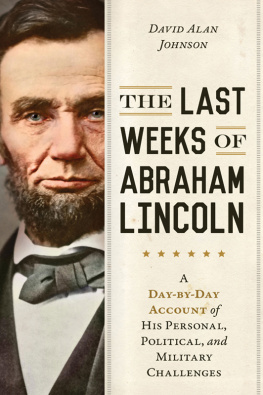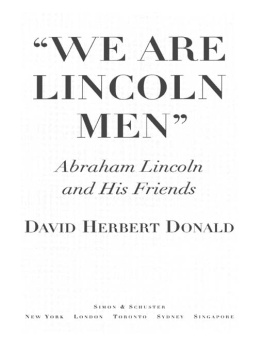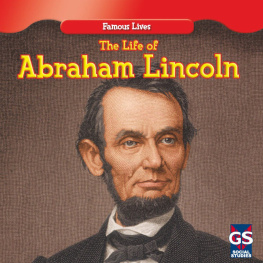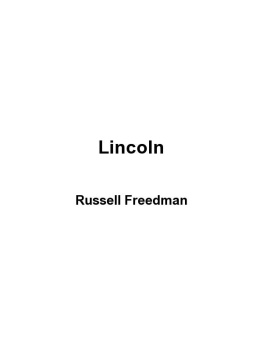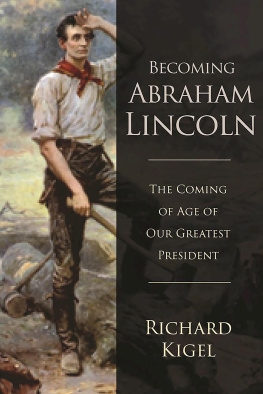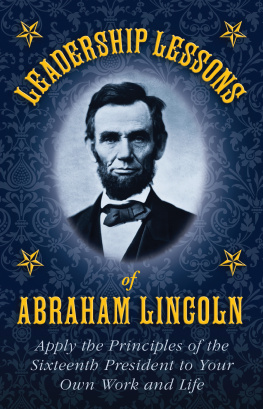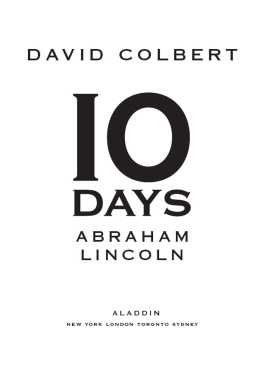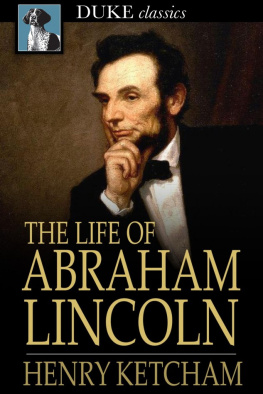
I received a great deal of assistance from librarians and historians in gathering all the material needed to put this book together, and I would like to single out a few individuals who went out of their way to help me out.
I would like to thank Jeffrey Bridgers at the Library of Congress for his assistance with photos.
Dr. James Cornelius of the Abraham Lincoln Presidential Library and Museum was also a great help. I would like to thank him for answering all of my many and persistent questions.
Also, many sincere thanks go out to the staff of the Union, New Jersey, Public Library. Thank you to Laura, Eileen, Denise, Susan, and all of their colleagues for their assistance.
And last, but certainly not least, many thanks to Laura Libby for all of her help and understanding, and for putting up with me once again, as she has done with every one of my other books.

LETTER FROM PRESIDENT LINCOLN TO GENERAL GRANT ON HIS PROMOTION, AND GRANT'S REPLY
[see Introduction, ]
Executive MANSION, WASHINGTON, April 30, 1864.
Lieut.-Gen. Grant:
Not expecting to see you before the Spring campaign opens, I wish to express in this war, my entire satisfaction with what you have done up to this time, so far as I understand it. The particulars of your plans I neither know, nor seek to know. You are vigilant and self-reliant; and pleased with this, I wish not to obtrude any restraints or constraints upon you. While I am very anxious that any great disaster, or capture of our men in great numbers, shall be avoided, I know that these points are less likely to escape your attention than they would be mine. If there be anything wanting which is within my power to give, do not fail to let me know it.
And now, with a brave army and a just cause, may God sustain you.
Yours, very truly.
A. LINCOLN.
HEADQUARTERS ARMIES OF THE UNITED STATES, CULPEPPER COURT-HOUSE, May 1, 1864.
THE PRESIDENT: Your very kind letter of yesterday is just received. The confidence you express for the future and satisfaction for the past in my military administration, is acknowledged with pride. It shall be my earnest endeavor that you and the country shall not be disappointed. From my first entrance into the volunteer service of the country to the present day, I have never had cause of complaint, have never expressed or implied a complaint against the Administration or the Secretary of War, for throwing any embarrassment in the way of my vigorously prosecuting what appeared to be my duty.
Indeed, since the promotion which placed me in command of all the armies, and in view of the great responsibility and importance of success, I have been astonished at the readiness which everything asked for has been yielded, without even an explanation being asked. Should my success be less than I desire and expect, the least I can say is, the fault is not with you.
Very truly, your obedient servant,
U. S. GRANT, Lieut.-Gen.
LINCOLN'S SECOND INAUGURAL ADDRESS
[see March 4, 1865, ]
[Fellow Countrymen:] At this second appearing to take the oath of the presidential office, there is less occasion for an extended address than there was at the first. Then a statement, somewhat in detail, of a course to be pursued, seemed fitting and proper. Now, at the expiration of four years, during which public declarations have been constantly called forth on every point and phase of the great contest which still absorbs the attention, and engrosses the enerergies [sic] of the nation, little that is new could be presented. The progress of our arms, upon which all else chiefly depends, is as well known to the public as to myself; and it is, I trust, reasonably satisfactory and encouraging to all. With high hope for the future, no prediction in regard to it is ventured.
On the occasion corresponding to this four years ago, all thoughts were anxiously directed to an impending civil-war. All dreaded itall sought to avert it. While the inaugural address was being delivered from this place, devoted altogether to saving the Union without war, insurgent agents were in the city seeking to destroy it without warseeking to dissol[v]e the Union, and divide effects, by negotiation. Both parties deprecated war; but one of them would make war rather than let the nation survive; and the other would accept war rather than let it perish. And the war came.
One eighth of the whole population were colored slaves, not distributed generally over the Union, but localized in the Southern part of it. These slaves constituted a peculiar and powerful interest. All knew that this interest was, somehow, the cause of the war. To strengthen, perpetuate, and extend this interest was the object for which the insurgents would rend the Union, even by war; while the government claimed no right to do more than to restrict the territorial enlargement of it.
Neither party expected for the war, the magnitude, or the duration, which it has already attained. Neither anticipated that the cause of the conflict might cease with, or even before, the conflict itself should cease. Each looked for an easier triumph, and a result less fundamental and astounding.
Both read the same Bible, and pray to the same God; and each invokes His aid against the other. It may seem strange that any men should dare to ask a just God's assistance in wringing their bread from the sweat of other men's faces; but let us judge not that we be not judged. The prayers of both could not be answered; that of neither has been answered fully. The Almighty has His own purposes. Woe unto the world because of offences! for it must needs be that offences come; but woe to that man by whom the offence cometh! If we shall suppose that American Slavery is one of those offences which, in the providence of God, must needs come, but which, having continued through His appointed time, He now wills to remove, and that He gives to both North and South, this terrible war, as the woe due to those by whom the offence came, shall we discern therein any departure from those divine attributes which the believers in a Living God always ascribe to Him? Fondly do we hopefervently do we praythat this mighty scourge of war may speedily pass away. Yet, if God wills that it continue, until all the wealth piled by the bond-man's two hundred and fifty years of unrequited toil shall be sunk, and until every drop of blood drawn with the lash, shall be paid by another drawn with the sword, as was said three thousand years ago, so still it must be said the judgments of the Lord, are true and righteous altogether.
With malice toward none; with charity for all; with firmness in the right, as God gives us to see the right, let us strive on to finish the work we are in; to bind up the nation's wounds; to care for him who shall have borne the battle, and for his widow, and his orphanto do all which may achieve and cherish a just, and a lasting peace, among ourselves, and with all nations.
LINCOLN'S CONDITIONS FOR PEACE
[see April 5, 1865, ]
1. The restoration of the national authority throughout all the States.
2. No receding by the Executive of the United States on the slavery question, from the position assumed thereon, in the late Annual Message to Congress, and in preceding documents.
3. No cessation of hostilities short of an end of the war, and the disbanding of all force hostile to the government.
That all propositions coming from those now in hostility to the government; and not inconsistent with the foregoing, will be respectfully considered, and passed upon in a spirit of sincere liberality.
Next page
